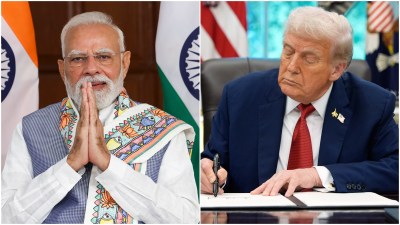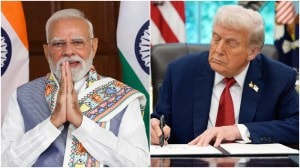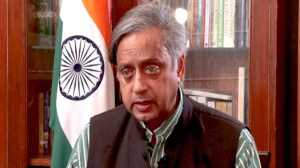Stay updated with the latest - Click here to follow us on Instagram
Govt committed to upholding judiciary’s independence: PP Chaudhary
MoS (Law), P P Chaudhary tells Indian express that even Indira Gandhi wanted to bring in the Uniform Civil Code and insists that the government has put the NJAC row behind it.
 PP Chaudhary (right) with Chief Justice T S Thakur.
PP Chaudhary (right) with Chief Justice T S Thakur.
In his first interview after taking charge as MoS (Law) last week, P P Chaudhary tells Utkarsh Anand that even Indira Gandhi wanted to bring in the Uniform Civil Code and insists that the government has put the NJAC row behind it. Excerpts:
On the SC seeking the government’s views on issues like Uniform Civil Code, triple talaq and Christian divorce law:
These issues are to be considered in larger public interest as they relate to national integration. On May 8, 1971, on the request of then Prime Minister Indira Gandhi, eminent jurist Nani Palkhivala had written to the government to bring in a Uniform Civil Code. The Congress, which now sees politics in it, should first find out what fate that letter met. I have raised this to drive home the point that the issue of the Uniform Civil Code was in the mind of a Prime Minister even in 1972. Besides, we have now sent the matter to the Law Commission for a detailed study. The government will take into consideration the mandate of Article 44 of the Constitution, the Law Commission’s report and its relation to the integration of the issue. The government will examine everything in its entirety before taking a stand.
[related-post]
Watch Video: What’s making news
On losing NJAC after an aggressive legal battle and the way forward:
The Supreme Court did what it had to do and we did what we are supposed to do as the government — defend a law. But there is no question of the government playing politics with judges and the Supreme Court. We respect and trust the judiciary. This government is committed to upholding the independence of the judiciary and whatever we do from here, it will be well within the constitutional framework and our rights.
On allegations that the government has resorted to arm-twisting tactics by not clearing appointments of judges:
I don’t see any problems between the judiciary and government. I am definite that the appointments will happen. There are issues following the NJAC judgment but we both (government and judiciary) are trying to resolve it. I am sure the ice will be broken soon and proper appointments will go through.
On whether the NDA was right in aggressively pursuing laws to make the NJAC and National Tax Tribunal a reality:
The UPA government must also share the blame for laws having been struck down by the Supreme Court; we cannot solely be held accountable. Besides, what other alternatives did we have? We had taken over as the government and we had to defend these laws. And then not everything was wrong with these legislation.
On BJP MP Subramanian Swamy seeking Attorney General Mukul Rohatgi’s removal for losing important cases:
It may be Mr Swamy’s personal view. The government and the party have faith in Mr Rohatgi’s ability as the top law officer.
On Chief Justice T S Thakur’s plea to increase the number of judges:
You cannot blame the Centre for this. The sanctioned strength has to come from the states and only then the question of funds arises. It is for the states to first prepare the infrastructure and then send us their revised sanctioned strengths for disbursal of funds.
On CJI’s appeal to the government to not criticise the judiciary alone for pendency of cases:
We don’t blame the judiciary for it but what can we do if people complain against the judiciary for delay in deciding cases. The criticism is mainly from the people, not the government. I maintain that the government has complete faith in the judiciary’s ability.
On finalising the Memorandum of Procedure (MoP) for appointment of judges:
It’s a secret document till it is notified. The issue is presently between the government and the judiciary. Meetings are taking place and we are hopeful that common ground will be reached very soon. At the same time, I can assure you that all the flaws in the previous MoP shall be removed from the new document. It has to be transparent and capable of guiding to appointment of good judges.
On whether judicial appointments were discussed in his meeting with the CJI:
I met the Hon’ble CJI as a courtesy call after I took over. I have always respected him as a judge. There was no formal interaction between us. We discussed our career and lives as lawyers. It was a very pleasant meeting.
On his appointment as MoS Law:
I had no idea of my appointment; I did not meet the Prime Minister before my appointment. One day, I was informed about my elevation and was told to be ready for this responsibility. My 38 years of experience as a lawyer and two years in the government will come handy in performing my duties.







